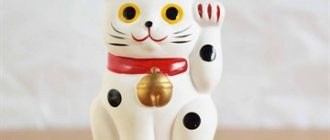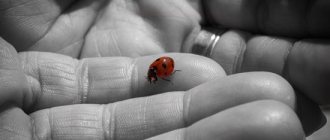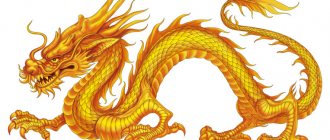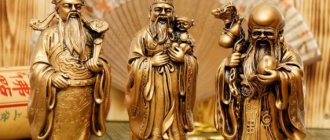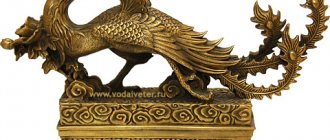Gods of wealth, prosperity and luck.
We all want to be happy.
And many believe that wealth and prosperity will bring them happiness. And some people simply believe in luck. Let it be as they wish, and let them be rewarded according to their dreams. Let's just see what divine entities help in this matter. The presence of which gods promises both wealth and good luck. What gods exist that help in money matters? Read about them, look at them. Decide who suits you best. Try to have an image of this God in an accessible place, and from time to time contact your patron. It is said that this is very conducive to achieving wealth.
Patron Gods of Trade and Economics will be very interesting .
SLAVIC GODS OF WEALTH
VELES is the economic god, he was also responsible for domestic animals, it’s not for nothing that he is the “cattle god”, and he was not the last figure in the arable land. The last few unharvested spikelets were called “Veles on the beard.”
MAKOSH - Goddess of fertility, patroness of needlewomen. Some read her name as "Mother of Purses." As the Goddess of Fertility, she is also the Goddess of abundance and prosperity.
ABOVES OF HEAVEN - sometimes this symbol is called the Agidel amulet. And so you can’t immediately tell who the sign is dedicated to: the Gods of Water use it, and the Gods of Air, and there is a place for it in Meteorological Magic. A multi-valued symbol, it develops intuition, attracts happiness and good luck (and therefore the Gods of Wealth and the Diviner Gods also consider it theirs). And also, as a sign of the Goddess Agidel, the sign “Heavenly Abyss” is recommended to all women - to strengthen and increase their beauty and charm (hence, it also turned out to be one of the Goddesses of Beauty).
They say that this sign has a special power: it will protect you from various troubles and worries, it will take away bitterness and failure from you, and it can also protect your thoughts from darkness.
WATCHMAN is a protective sign belonging to God Chur.
The sign is somewhat similar to a person. In this case, a person who guards borders. The sign protects and protects, and, as a result, helps to increase prosperity and wealth. The gods of wealth also welcome this sign.
The sign can be made of any material: burned on birch bark, carved from wood, smelted from metal. This could be an imprint on ceramics or embroidery on a towel.
GODS OF WEALTH IN OTHER PEOPLES.
The most famous of them are the seven gods of happiness - Ebisu, Daikoku, Bishamon, Saraswati, Hotei, Juradzin and Fukurokuzen.
“team seven” from Japan, India and China. Figurines of these gods of luck (all together, or each separately, or one of them) can often be seen not only in homes, but in the most unexpected places: in offices, restaurants, shops.
Let's see what these mysterious eastern deities are, who have been bringing goodness and prosperity for more than one millennium.
EBISU - God of honest work and prosperity. Brings success in the profession
PEDIGREE. It is believed that he comes from Japan, and his teacher and friend is the god of wealth Daikoku. They say that at birth he was crippled, but then a miracle happened and his arms and legs grew, although he remained slightly deaf.
SACRED ANIMAL (SYMBOL): sea bass (tai fish)
I'm near the statue of the god Ebisu
SYMBOLISM. Ebisu symbolizes honesty in business and justice
APPEARANCE. An ordinary fisherman with a fishing rod, wearing a flattened cap.
FANS: fishermen, farmers, sailors
WORSHIP DAY - 20th of every month.
ACTIVATION (CALLING THE DEITY) - place his figurine near the flowing water and call the god of luck Ebisu
DAIKOKU is the god of wealth, as well as a god who, with the help of a magic hammer, can fulfill any desires of people. God of cuisine and agriculture.
OTHER NAME: Daikokuten or Great Black
PEDIGREE. He comes from India, where his name was Mahakala, and then he came to Japan through China.
APPEARANCE and ATTRIBUTES. He always carries a bag of rice and a hammer with him. True, they say that there is not always rice in the bag. Sometimes there are coins or even precious stones there. And as soon as a rat gnaws a hole in the bag, these pebbles (or coins) begin to fall to the ground. So know: rats are useful creatures, especially if they are accustomed and gnaw through a bag of wealth so that their owner’s wealth increases.
PATRONAGE. This deity used to favor warriors, but then abruptly changed his role and decided that wealth was somehow more reliable
ACTIVATION (CALL OF THE DIVINE) - performance of a special sacred dance of Daikoku
BISYAMON is a warrior god, but at the same time he is the god of prosperity and wealth. God is the protector of temples. He is the guardian of the North, able to exorcise demons. He punishes Evil, and gives good people treasures (or at least wealth).
SYMBOLISM. Bishamon is dignity itself.
PEDIGREE. They say that he comes from India. His middle name is Tamonten - this is his name as one of the four heavenly guardians. He is strong and merciful. And in Sanskrit his name means God who hears everything.
APPEARANCE and ATTRIBUTES. Warrior in full samurai armor with a spear and a small model of a pagoda (hoto)
SACRED ANIMAL - dove
FANS: military, doctors, lawyers
BENTEN (SARASWATI) - goddess of wisdom and luck.
OTHER NAME - Benzaiten
HABITAT: water, sea. In India she was considered the deity of rivers
SPHERE OF INFLUENCE: art and thirst for knowledge, wisdom and love, luck. Patronizes artists, musicians, writers.
SPECIAL PATRONAGE: music and water (water shows are exactly the elements where she is rightfully the first)
PROTECTION. They say that the Saraswati figurine can protect from the water element, and from other natural disasters.
SYMBOLIC ANIMAL - sea dragon, snake.
She is said to have sixteen assistants, one for each art form.
KHOTEY is the god of happiness and good nature, compassion and carelessness, cheerfulness and abundance.
The NAME is Japanese HOTEI - canvas bag - and it (the bag) is really present in all images of this god.
APPEARANCE: very fat, cheerful old man
AS A TALISMAN - the Hotei figurine is used to attract wealth and good luck. And they also talk about the number 300. That’s how many times (three hundred!) you need to stroke Khotey’s plump belly, while wishing good things for yourself and those around you, and then happiness will definitely pour out of his bag.
SPHERE OF INFLUENCE: he inspires people to drink deliciously and eat plentifully. Very popular in the restaurant business. They also say that he was a predictor, and all his predictions certainly came true.
JYURODZIN - god of longevity. He is not considered a drunkard, but he drinks a lot of sake.
SPHERE OF INFLUENCE - can give longevity, and this in itself is happiness and good luck.
SYMBOLIC ANIMAL - crane, turtle and deer.
LEGEND. They say that there was a Taoist hermit who sought and found the elixir of immortality. He wrote down the recipe for longevity in his scroll of wisdom, attached it to his staff, and now the god Dzyuradzin walks the earth, and can give many years to those who greet him.
Veles - God of what
First of all, the Slavs considered Veles the God of wisdom. That is why he patronized the priests and wise men. The spiritual mentor led the path of development for all those who had the desire to comprehend the truth of existence. He also told them to live according to truth and conscience.
In addition, Veles, embodied in various guises, was considered the patron of the following spheres:
- the lord of virgin nature - the bestial god;
- protector of travelers - master of the roads, guide of all roads;
- Black God is the ruler of Navi, the master of the unknown;
- lifetime tester and posthumous judge;
- lord of magic;
- patron of trade, bestowing prosperity;
- giver of wealth;
- patron of the arts;
- a warrior who protects from visible and invisible enemies;
- god of luck;
- god of dead and living water.
What is its strength and what is it responsible for?
The ancient Slavs believed that it was Veles who managed to unravel the secrets of the universe, to know the forces of darkness and light. Therefore, he was responsible for their storage. His great mind allowed him to subjugate and control the 4 elements, which led to the emergence of the flow of time.
Veles absorbed all the wisdom of the Universe, as a result of which he became responsible for preserving the greatest secrets of the Universe and enlightening a special caste of humanity, which included magicians, sorcerers and seers.
IMPORTANT. The ancient Slavic God showed the greatest disposition towards storytellers and poets, since they knew how to convey the divine will to mere mortals in a form accessible to perception.
Veles was responsible for the fertility of the lands, fruitful years and the wealth of the Slavs. There were beliefs that his beard descended from heaven to earth, turning there into a source of life for all flora and fauna.
REFERENCE. In those days, there was a tradition that provided for leaving a bouquet of ears of corn and flowers for Veles’s beard upon completion of successful agricultural work.
In addition, the ancient Slavic God was responsible for everything supernatural and unknown; his power was directly related to natural cycles. He could trigger a cycle of typical events and create powerful illusions.
You may be interested in: Svarog Slavic god of fire and justice: Mythology, symbols, legends about the blacksmith god
Veles' Law
Veles was considered to be one of the wisest representatives of the pantheon of Gods. Even his main law was filled with the deepest prudence, since it stated that a person must coexist harmoniously with the world around him.
That is why the peoples who worshiped him respected nature and creativity, appeasing their patron with the help of bloodless sacrifices.
ATTENTION. It was customary to bring kvass, nuts, honey, berries, copper coins and medicinal herbs as gifts to Veles.
Commandments
The commandments of the Slavic God Veles are as follows:
- Love the world around you as you love yourself, because it is part of you.
- Don't look for harmony outside, it is inside you. Be grateful to Nature for your strength, which you do not waste in vain.
- Your capabilities are insignificant compared to the world's forces.
- Expect peace and don't forget about farming.
- The city and the village are the body of darkness and earth, respectively.
- If you find yourself in a city, illuminate the darkness around you with your inner light, you will learn the essence of the Book of Wisdom.
- The world needs the power of light, like spring water.
- You will not force anyone to drink and shine.
- The Light of the Gods has life-giving abilities.
- A bright life is always nearby, it will guide you, making you omnipotent.
- A timely visit to the soul will have a beneficial effect on it.
- There is no need to be afraid of the darkness if you exist with pure, bright thoughts.
- You won’t see clearly if you hide from the darkness, and the burning light only blinds you.
- You live if you understand the great world around you.
- Without understanding, life becomes a burden.
- Everything has its own measure.
- If you understand the will of the Gods and lead a proper lifestyle, then you will know true happiness.
- Greatness will not allow outsiders to see your weaknesses.
- One should live in wisdom, peace, love and goodness.
- Today is the way to tomorrow.
- Keep peace in your soul and create peace in the Universe.
- Everything sown by the Gods is the essence, your food, created for your good.
- Don’t muddy the water you drink, otherwise it will become dopey hops.
- There are 4 measures in the world: breathing, thoughts, conscience, shame.
- Take the breath of light, and the whole world will transform around you.
- There is joy and light in the souls of the living, therefore they live in the Upper Worlds.
- Live in your worlds, and other worlds will open to you in due course.
- The world of our beginning is the world of your end, but the world of your beginning is not in the world of our end.
- Do not be inactive, because only work will open the doors to a new world of the future.
People's attitudes towards wealth and prosperity
From the very beginning of human development, everyone has strived not only to survive, but also to thrive in all areas of life. In any era, if wealth and material wealth were not valued, then luck, authority and fame among others were valued.
People were afraid that they simply could not achieve success on their own, which is why they turned to deities who brought wealth and prosperity. Many believed in the protection of the gods and prayed to them. They always shared what a person had with the deities, made donations, hoping for mercy and help, which historically came sooner or later. But the gods helped or it was just luck, you and I won’t know.
Legends and descriptions of Western and Eastern gods, responsible for prosperity and good luck, have reached our time.
Prayer for husband's drunkenness to Nicholas the Wonderworker
Secluded in a cozy room, light church candles. Place Orthodox icons of Jesus Christ, the Most Holy Theotokos, St. Nicholas the Wonderworker and the Blessed Eldress Matrona of Moscow nearby. Prepare a vessel with holy water. You will quietly add it to the drinks of those who drink excessively.
Wonderworker Nicholas, I turn to you with a prayer. Generously have mercy and deliver my husband from demonic drunkenness. Against his will, they found disgust and devastated his craving for drunken libation. He will not sip, swallow or pour out harmful drink without a shudder. And he will sip and pour the property into the belly of holy water. Thy will be done. Amen.
Pray tirelessly to Nicholas the Pleasant for the final result, having time to go to the Orthodox Church and submit customized notes for your drinking husband. This must be done once every 10 days.
Slavic gods of wealth
In pagan Rus', the person who had a huge barnyard was considered rich and lucky; in other words, wealth was measured by livestock. To increase their wealth, people prayed to Veles, the god of wealth, popularly called the god of cattle.
Scripture says that it was Veles who set the world in motion. Such concepts as day and night, seasons, bad and good appeared. Veles taught people to appreciate what they have and to achieve more by overcoming difficulties.
To attract good luck from the god of wealth, it was customary for the Slavs to leave donations to him or, one might say, a tribute from everything that was added to their lives. Whether it was a harvest harvested in the fall or a profitable trade deal. Donating what was acquired was considered a guarantee of Veles' patronage in the future.
The Slavs represented the pagan god of wealth according to one source:
- a man dressed in bull's skin;
- a richly dressed old man with a beard made of wheat.
After baptism in Rus', the functions of Veles were transferred by people to St. Nicholas the Wonderworker, whose image to this day is similar to the description in fairy tales and chronicles of the god Veles.
Roman gods of wealth and prosperity
The Roman Empire is famous for its wealth. The people believed in the protection of the goddess Fortuna, who brought good luck. Initially, the goddess was prayed for fertility and weather, later she was addressed as the goddess of fate. No one knows in advance how fate will turn towards a person.
Fortune is most often depicted as a girl with a blindfold. It is the bandage that symbolizes the fact that the goddess does not evaluate the situation, but simply distributes good luck.
A number of worlds claim that Pluto is the god of wealth in Rome. He was often compared to the Greek Plutos. Pluto in Rome is the god of money and wealth.
Why is money flowing away?
Many people today notice that all the money they earned through back-breaking work slips away like sand through their fingers.
Unforeseen expenses and expenses often arise, and often illnesses deprive them of part of their income. It often happens that all efforts are not rewarded as desired. And the money spent on what you love does not pay off.
In such life situations, an obsessive question arises in your head about why this is happening. Esotericists, Viktor Nikolaevich Lukin, also help to find the answer.
For 35 years, he has been focused on financial issues and has a huge practice, helping absolutely everyone who turns to him for advice and comes for help.
And when a dangerous financial drought comes into everyday life, it becomes very difficult to attract new cash flows into it. In order not to bring your financial situation to such an extent, you need to learn how to retain money.
And the more stable the flow of finance is established, the higher the level of prosperity will subsequently increase, and monetary well-being will come closer.
Feng Shui
Eastern countries: China, India and Japan - gave the world seven deities who give wealth, abundance and good luck. Today we know how the seven gods of luck and wealth are depicted in the form of small mascot figures.
According to another belief, the monk Tenkoy learned about the seven blessings that identify each deity. Nowadays, talismans are popular, most often made with wood carvings using the netsuke technique.
Daikoku
The god of wealth and prosperity in Japan is Daikoku. The god is depicted in national costume with a mallet in his hands and a bag of rice. Sometimes the god Daikoku is depicted crawling out of a bag or in a bag. He is considered the god who gives wealth.
In Japan, it is believed that the animal rat lives only in rich houses, where there is an abundance of food and supplies.
According to legend, the Daikoku bag contains a lot of rice, coins and jewelry. It is the rat who gnaws the bag while dancing with a mallet, calling luck and wealth into the world, and all the contents pour out of it.
It is recommended to place the talisman in a visible place where it would most often catch the eye. According to legend, it is attention to the talisman that will reward you with prosperity. If you take the palms of Dayokoku and rub it, then wealth and prosperity will come to you.
The most famous masons
Among the Masons there are a lot of famous people who have achieved wealth and incredible success in their activities. Let us note the most prominent representatives:
- Harry Truman is the 33rd President of the United States.
- Mikhail Kutuzov is a great Russian commander.
- Louis Armstrong is an outstanding jazz musician.
- Mark Twain is a famous writer.
- Vladimir Lenin - politician, leader of the Bolshevik Party.
- Arthur Conan Doyle is the author of detective stories about Sherlock Holmes.
- Alexander III is the Emperor of Russia.
- Henry Ford - automobile tycoon.
- Alexander Kerensky is a statesman and public figure, lawyer.
- Winston Churchill is the Prime Minister of England.
Surely you know all these names. These people were Freemasons and their names went down in history forever.
Becoming rich is real, you just need to decide to do it, believe in yourself and success. In Freemasonry, money is likened to the elements. The cash flow is mobile, like water, and is always looking for where to direct the flow. If there is stagnation in the monetary sphere, it resembles a swamp and it is very difficult to stir it up. The Masonic formula for wealth helps you find goals and means to achieve them. But remember that you won’t become rich on your own; to do this, you first need to try. Our enriching course “Big money by your own rules” will help you with this. As soon as you establish cash flow, money will flow to you like a river.
https://dailyhoro.ru/article/tajnyi-masonov-kogda-bogatstvo-samo-idet-v-ruki/https://grimuar.ru/zashita/talisman-i-amulet/secret-uspeha.htmlhttps:// www.dowlatow.ru/privlechenie-deneg/sekrety-bogatstva-privlechenie-deneg/masonskaya-formula-bogatstva/
Ebisu
The god of luck and happiness, Ebisu, is the only one of the seven happiness of Japanese origin, considered the god of hard work. According to legend, a boy named Hiruko was born without arms, legs or bones. At the age of one, he was carried away on a boat to the sea, where he had to survive in inhumane conditions. Fate subjected him to terrible trials. He swam for a long time until he washed up on the island. He was saved by a fisherman named Ebisu Saburo, who subsequently raised him as his own son. When the boy was three years old, the gods had mercy on the baby, taking into account all the difficult trials he had passed. So Hiruko’s arms and legs grew, and he became a deity named Ebisu.
God Ebisu is depicted as a cheerful old man with a fish in his hands and a fishing rod or fan. Most often, the gods Ebisu and Daikoku are placed together; according to legend, their strength together is more powerful and will definitely bring happiness.
Bishamon
God Bishamon was borrowed from India, where he was the god of war or in other words, the warrior God who protected and guarded the heavens. In Japan, it is believed that Bishamon brings people wealth and early luck, being officially the god of wealth. In Japan, it is believed that the Warrior God fights on the side of good, destroying evil in the world, giving happiness to everyone who asks.
Most often, Bishamon is depicted in armor and a helmet, holding a weapon in his hands. It is believed that if you keep the Bishamon figurine with you or in a visible place, then financial improvements will come.
Hotei
Hotei is the god of wealth. God Hotei is the god of prosperity, fun and communication. According to legend, he was a wandering monk of Tsitsa who brought fun with him. The monk traveled with a bag, or hotei in Japanese. According to legend, it was from his bag that Hotei extracted everything that people asked for. So Hotei became the god of wealth. It was believed that he had the whole world in his bag. After the monk died, he was considered the eighth reincarnation of Buddha. Hotei is considered the only mortal god from the “seven of fortune.” Hotei is often compared to a laughing Buddha.
God Hotei is depicted with a bag and a coin or piece of gold. His figurine should be placed in a prominent place in your apartment or office, and it will definitely bring wealth.
Fukurokuju
God Fukurokuju is the god of wisdom and longevity, his origin is Chinese. It is Fukurokuju who is the first Chinese god of wealth. According to legend, Fukurokuju influenced the Emperor of China with his wisdom in the matter of recruiting young men from the villages, thereby earning the worship and honor of the Chinese people. Legend also says that Fukurokuju is the incarnation of the North Star of the south. The deity Fukurokuju is not alien to the company of women and the use of alcoholic beverages. Love for human pleasures does not interfere with being a god.
The figurine of God is depicted as an old man with an elongated head; the people associate this feature with wisdom. In the hands of the sage is a scroll where all the wisdom of the world is described and a staff. In Japan there is a legend that if you put a figurine of God under your pillow on New Year's Eve, you will have a prophetic dream. In the morning, the Japanese always write it down on paper and analyze it.
Jurojin
Jurojin is considered the god of longevity. Jurojin is most often compared to the god Fukurokuju; his appearance, origin, and attributes are the same. Sometimes it is said that two deities live in one body. An old man can be depicted with a staff, sometimes with a musical instrument, the sound of which, according to legend, makes a person look younger, or a turtle, which is a symbol of longevity in Japan. The only difference between the gods is that the shape of their heads is different. God grants not only longevity, but also teaches people honors in old age.
A figurine of the deity Jurojin given as a gift for a birthday prophesies longevity for the birthday person.
How does a Masonic lodge work?
A Grand Lodge is an independent organization that controls Freemasonry in a particular country or geographic area, called a jurisdiction.
There is no single organization that would govern all world Freemasonry. Relations between jurisdictions of different countries depend only on whether they recognize each other or not. The oldest and largest Grand Lodge is the United Grand Lodge of England (UGLA).
The Lodge is the basic organizational unit of Freemasonry and must have a "patent" issued by the Grand Lodge. Lodges existing without this document are considered illegal.
The Lodge must meet regularly on set dates. At meetings, elections and initiations of new members take place, promotions of existing ones take place, minutes and reports are read out, and property reports are decided. As a rule, lodge members pay membership fees to participate.
Most lodges are attended by members who live or work nearby. Others unite Masons who share the same interests or occupations.
Each candidate for membership in the lodge, according to general Masonic principles, must be at least 21 years old, have a good reputation, and have no problems with the law. The decision to join an organization must be a conscious decision. A separate point is his faith in God, which he must confirm, but which remains on his conscience.
The vote to accept a candidate takes place secretly. Those voting for entry use white balls, those voting against use black balls.
According to the Anderson Constitution, only men can become Freemasons. However, it is known that before 1723, several women were nevertheless accepted into the organization. One of them was Elizabeth Aldworth, known as the Lady Mason.
Although women cannot join Masonic lodges, there are several Masonic-friendly regular organizations that are open to women: the Order of the Eastern Star, the Daughters of the Nile, the Purple Order and the White Temple of Jerusalem. They are based on the Masonic model, but have their own traditions.
The Masonic organization is closely associated with charity and donates money for medical care and research, educational grants, and the search for missing children.
Benzaiten
God Benzaiten is considered the deity of the water element and eloquence. Benzaiten is the only woman in the lucky seven. According to the scripture, she defeated a terrible dragon that devoured children. It was the woman who charmed him with her femininity and eloquence. Benzaiten seduced the dragon and married him, which radically changed the life of her dragon husband. The deity has Indian roots. In India, Benzaiten is considered an image of femininity.
The goddess is most often depicted naked or in beautiful clothes, creating the most sophisticated image possible. In rare cases, the goddess is depicted with a snake or on a dragon. A Benzaiten figurine will bring family well-being to every woman.
Throughout history, many people worshiped the gods and believed in their powerful power. With or without the help of divine power and protection, every person by nature strives to survive, and therefore to thrive. Any person desires more not only in wealth, but also in luck.
Masonic rules. What does the Constitution say?
Some of the rules were explained through “construction” metaphors - which, in fact, is logical, because masons are builders of temples. Faith in God was declared the main value. He was called the Great Architect of the Universe
Moreover, it does not matter what religion a person was originally. He could continue to honor his Creator - the main thing here is faith in the Almighty, and not the presence of any specific deity
The legend about the death of Master Hiram has become significant for the Masons. He supervised the construction of Solomon's Temple, but brutally exploited his apprentices. Therefore, the builders rebelled and killed the master, regaining their quiet life and the opportunity to calmly complete the construction of the sacred place.
This story clearly shows that Freemasons are fighting for justice and seeking to restore the balance of power between “masters” and “slaves.” Of course, such rules could not be legal in royal England: the Masons were forced to encrypt.
All other postulates of the Constitution are moral and ethical. Masons must be spiritual, devote time to self-improvement, do not steal, do not kill, do good, perform acts of charity if the means are available.

